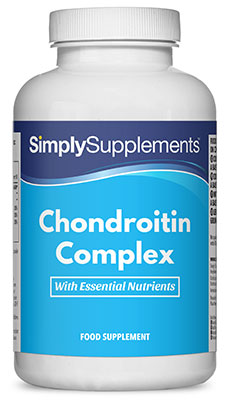Health Benefits of Chondroitin

Chondroitin is a complex sugar which is naturally found in the cartilage that protects our joints. Over time, normal levels of chondroitin may start to decline, however, and there is evidence to suggest that supplementing with chondroitin may help to alleviate or even reverse age-related joint problems such as arthritis.
What Are the Benefits on Chondroitin?
Unlike some other supplements, which seem to offer a multitude of potential health benefits, chondroitin tends to be taken for one reason and one reason only. Namely, chondroitin is believed by many to have a beneficial impact on arthritic joints. Many scientists believe that chondroitin helps to reduce pain and improve range-of-movement in a number of ways, which work synergistically to produce the improvements many people experience.
Cartilage Loss
 Cartilage is a hard-wearing material that protects the ends of our bones where they meet at a joint. As a result they ensure that joints move smoothly and without discomfort. Sadly, as a result of age, sporting injuries or other medical conditions cartilage can start to wear thin. When this happens, we see the symptoms known to most of us as arthritis - namely stiffer, less flexible joints and the onset of pain.
Cartilage is a hard-wearing material that protects the ends of our bones where they meet at a joint. As a result they ensure that joints move smoothly and without discomfort. Sadly, as a result of age, sporting injuries or other medical conditions cartilage can start to wear thin. When this happens, we see the symptoms known to most of us as arthritis - namely stiffer, less flexible joints and the onset of pain.
Chondroitin is a well-known substance, and has been the subject of much research in recent years. Just one of the benefits that chondroitin seems to offer is the potential to prevent this breakdown of cartilage that lies at the route of many cases of arthritis.
In a study pitting a number of different supplements against one another, the scientists in question found that chondroitin successfully inhibited the activity of enzymes typically responsible for the breakdown of cartilage. Interestingly, glucosamine which is equally popular as a joint supplement seemed not to impact these enzymes. Perhaps this helps to explain why so many people opt to take both in conjunction, as the evidence suggests that they may help to protect joints in slightly different manners.
Another way to assess the loss of joint cartilage is using radiography to actually measure the so-called “joint spacing”. As this space narrows, so the odds of friction and inflammation increase, as do the symptoms of arthritis. In a study involving 622 patients with osteoarthritis in the knee, participants were either given 800 mg of chondroitin or a placebo every day for two years while joint spacing was regularly measured.
The results of the experiment showed that while the placebo group saw a 41% reduction in joint space, the group enjoying chondroitin saw a far smaller decline of just 28%. Alongside this, the scientists reported that the chondroitin group experienced significant pain improvements, and that the safety levels were equal.
It seems that chondroitin may therefore help to arrest the decline in cartilage volume typically experienced with age, and so may keep you active for longer.
Joint Pain
In a complex experiment involving 146 patients over a six month period, each volunteer was given either daily chondroitin supplements or a placebo. What made the study so interesting was that participants did not necessarily receive the same treatment for the entire time, with some individuals unwittingly being swapped part way through the study period.
This not only allowed the scientists in question to assess the level of impact that chondroitin had on joint pain, but furthermore by swapping medications they could see how long the beneficial impacts took to appear, and how long they remained after treatment ceased.
The results suggest that chondroitin showed a gentle, gradual improvement in joint pain, but that the beneficial effects remained for up to three months after the end of the experiment.
Arthritis tends to be most common in so-called “load bearing” joints like knees and hips. This can be debilitating enough, but arthritic finger joints can be particularly unpleasant, significantly impacting everyday activity. It has been estimated that roughly 10% of people over the age of 40 suffer a degree of arthritis in their hands, and that the incidence of this condition rises with age. If studies are to be believed, 92% of individuals over the age of 70 are affected.
Scientists have investigated the impact of chondroitin on arthritic finger joints. In one analysis 139 patients were provided either with a daily chondroitin supplement or a placebo pill. Neither group knew which supplement they were receiving. All participants then underwent regular assessments to monitor the pain they felt in their hands.
As it turned out, the chondroitin group saw considerable improvements in overall pain, though this improvement took up to three months to appear. This suggests that, while beneficial, chondroitin is a “slow acting” substance that may require long-term use before the full benefits are experienced.
Inflammation & Swelling
One of the biggest studies to date addressing supplementation for arthritis is known as the Glucosamine/Chondroitin Arthritis Intervention Trial - better known as simply “GAIT”. Over 1500 arthritis sufferers took part, having been prescribed glucosamine, chondroitin or a placebo. A notable result was that the group taking chondroitin showed a “statistically significant improvement in knee joint swelling”.
Functional Ability
While nobody would deny that the pain experienced by many arthritis sufferers can be debilitating, one aspect often ignored in scientific literature is the concept of “functional ability” - quite simply how arthritic joints can impact everyday activities and quality of life.
This concept, however, was addressed in a study from Paris. Patients were given 800 mg of chondroitin per day, with the primary metric for impact being improvement in general function. At the end of the 12 month study, individuals taking the high levels of chondroitin saw improvements in functional ability of almost 50% over those taking the placebo. What is more, tolerance was “excellent or good” for the vast majority of participants, helping to underline the safety of chondroitin supplementation.
This ability of chondroitin to improve functional ability was also indicated in another study, in which cartilage was studied in the lab. It was found that after treatment with chondroitin the “friction coefficient” declined. In plain English, it seems that chondroitin helps cartilage to move more smoothly, which may have a positive impact on overall joint mobility.
Reduced Drug Use
One common concern among arthritis sufferers is the reliance on prescription medications to manage their symptoms. These so-called “non-steroidal anti-inflammatory drugs” or NSAIDs may show unpleasant side effects, so more natural arthritis treatments are normally well received.
Just like glucosamine, there is research to suggest that regular supplementation with chondroitin may enable patients to significantly reduce their reliance on NSAIDs. A study involving 61 patients provided chondroitin supplements for a period of three months, before assessments of their progress was made. The scientists indicated that thanks to the improvements shown, the use of NSAIDs could be reduced by 72% during chondroitin therapy with no impact on joint discomfort.
How Much Chondroitin Should I Take?
 In supplement form chondroitin is often sold as “chondroitin sulphate”. The addition of these salts to chondroitin helps to maximize absorption, ensuring you receive the most benefit possible. It is also often paired with glucosamine, as both supplements are believed to positively impact the joints, but in rather different ways.
In supplement form chondroitin is often sold as “chondroitin sulphate”. The addition of these salts to chondroitin helps to maximize absorption, ensuring you receive the most benefit possible. It is also often paired with glucosamine, as both supplements are believed to positively impact the joints, but in rather different ways.
A French study aimed to ascertain what dosage of chondroitin was likely to be most beneficial for arthritis sufferers. To this end they gave some volunteers 1200 mg of chondroitin in a single dose each day, while others were provided with 400 mg to take three times a day. Interestingly, the findings suggest that both dosages offered similar benefits, suggesting that arthritis sufferers are free to take chondroitin at timings that suit their lifestyles.
Most studies of chondroitin on joints have shown positive benefits with a daily dose of between 800 and 1200 mg. It is important to remember, however, that it can take some months for the full benefit to be felt. For this reason, if you decide to try chondroitin for your joints it is important to keep on taking the supplement for a moderately-long period of time, even if you don’t initially experience any improvement. The evidence seems to suggest that the beneficial impacts of chondroitin grow slowly over time until full efficacy is achieved.
Side Effects of Chondroitin
Despite the wealth of different studies on chondroitin, very few side effects have been experienced. For example a study of chondroitin involving 562 patients reported “no serious adverse reaction occurred in any study patients” while a deeper study on the safety record of chondroitin claimed that it is “safe and readily available” and has “great potential utility in the management of osteoarthritis”.
That said, most studies on chondroitin have understandably focused on more mature patients suffering from arthritis, and very little evidence exists for its safety in children or pregnant women.
It is advisable to consult your medical practitioner before starting to take any new supplement, so that you can be certain no negative interactions exist with your current health condition or medicinal regimen.
Summary
Chondroitin in a naturally-occurring substance, that seems to play a supportive role in the joints. A wealth of evidence suggests that supplementing with chondroitin may help to halt a number of physical symptoms related to arthritis. The research seems particularly strong regarding arthritis of the knees.
Fortunately, chondroitin is widely available and reasonably priced, but it is likely that it should be taken for 3+ months before the full impact of this supplement are felt. Arthritis sufferers may wish to consider combining chondroitin sulphate with glucosamine to maximize the impacts experienced.
Sources:
http://www.sciencedirect.com/science/article/pii/S1934148212001207
http://europepmc.org/abstract/med/8856618
https://www.ncbi.nlm.nih.gov/pmc/articles/PMC1119856/
http://europepmc.org/abstract/med/9123947
http://www.sciencedirect.com/science/article/pii/S1063458498800083
http://www.sciencedirect.com/science/article/pii/S0021929006003010
http://europepmc.org/abstract/med/9856136
http://www.sciencedirect.com/science/article/pii/S1063458408002045
http://onlinelibrary.wiley.com/doi/10.1002/art.24255/full
http://journals.lww.com/corr/Abstract/2000/12000/In_Vivo_Chondroprotection_and_Metabolic_Synergy_of.27.aspx

 Nicole
Nicole 

























